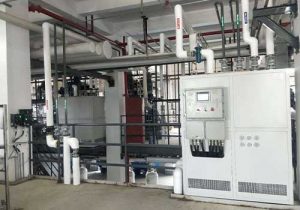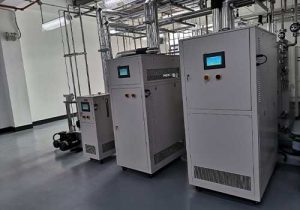industrial chiller cost
Understanding Industrial Chiller Costs
Industrial chillers are essential for maintaining optimal temperatures in various processes across different industries. The cost of these chillers can vary widely, and understanding the factors that influence their price is crucial for making an informed purchase decision.

Factors Affecting Industrial Chiller Costs
Cooling Capacity: The cooling capacity required is a primary factor affecting the cost. Chillers with higher capacity typically come with a higher price tag. It’s important to match the chiller’s capacity to the needs of the application to avoid overpaying for unnecessary capacity or underperforming for the required cooling.
Type of Chiller: There are various types of chillers, including air-cooled, water-cooled, and evaporative-cooled. Air-cooled chillers are generally more cost-effective in terms of installation and maintenance due to their simpler design and the absence of water systems.
Energy Efficiency: High efficiency air cooled chillers may have a higher initial cost but can lead to significant savings in energy consumption over time. They often have better Energy Efficiency Ratios (EER), which is a measure of the cooling output per unit of energy input.

Maintenance Requirements: Chillers with low maintenance requirements can reduce the total cost of ownership. Air-cooled chillers, for example, do not require water treatment or the management of cooling towers, which can be costly.
Environmental Considerations: The environmental impact of chiller systems is increasingly important. High efficiency chillers contribute to lower carbon emissions and can help organizations meet sustainability goals.
Total Cost of Ownership
When considering the cost of an industrial chiller, it’s essential to look at the total cost of ownership (TCO), which includes:
Initial Purchase Cost: The upfront cost of the chiller system.
Installation Costs: The expenses associated with setting up the chiller, which can vary depending on the complexity of the system.
High efficiency air cooled chillers typically have lower operating costs due to their energy-saving capabilities.
Maintenance Costs: The ongoing expenses related to servicing and upkeep of the chiller.
Replacement Costs: The eventual cost of replacing the chiller after its service life has ended.
Making an Informed Decision

Selecting the right industrial chiller involves considering the application’s specific needs, the chiller’s efficiency, and the long-term costs. It’s advisable to work with a reputable supplier who can provide expert advice and support throughout the purchasing process. Factors such as the chiller’s cooling capacity, energy efficiency, and maintenance requirements should be carefully evaluated to ensure the best value for money.
Conclusion
Industrial chillers are a significant investment for any operation that requires precise temperature control. The cost of these systems is influenced by a variety of factors, and it’s important to consider both the initial purchase price and the ongoing expenses related to operation and maintenance. High efficiency air cooled chillers offer a reliable and cost-effective solution for many applications, with the added benefit of lower environmental impact. By understanding the factors that affect the cost of industrial chillers, businesses can make informed decisions that support their operational needs and sustainability goals.
Related recommendations
Battery Pack Test Water-Cooled Chiller System
1394Battery Pack Test Water-Cooled Chiller System The battery pack test water-cooled chiller system can realize the digitization of key experimental parameters in the entire reaction process and ...
View detailschillers prices
434Chillers Prices: A Detailed Analysis Introduction Chillers are essential components in various industries and commercial settings for maintaining optimal temperatures. When considering the...
View detailsReasons for Frosting of Low Temperature Chiller
1395Reasons for Frosting of Low Temperature Chiller When using a low-temperature chiller, there will be frosting. Although the frosting problem will not immediately cause the equipment to be unus...
View detailschiller unit price
310Chillers are essential pieces of equipment in numerous industries and applications, tasked with removing heat from a process or space. The price of a chiller unit is a key consideration for buyers...
View details
 LNEYA Chiller
LNEYA Chiller






HelloPlease log in